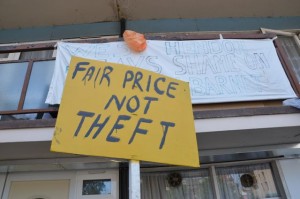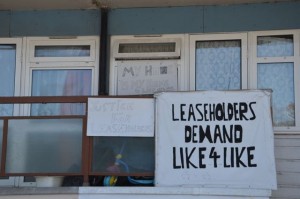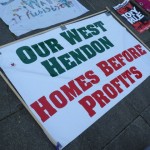
David Cameron wants to replace “the country’s most run down housing estates,” with “attractive and safe homes.” It’s part of a package aimed at ending poverty, as the government puts it, and “improving the life chances of the most disadvantaged.”
Well, that’s one way of addressing the housing crisis – with Victorian-style social reform. We’ll make old estates nicer and bingo! your life will be transformed.
Except – as anyone on a council house waiting list, or struggling to get together a huge deposit for a privately rented flat, or a monumental one for a mortgage will tell you – the housing crisis isn’t solved just by knocking houses down and starting again.
And regeneration isn’t as easy as Mr Cameron describes with characteristic trust-me breeziness in an article in the Sunday Times.
Many post-war council estates were badly planned. Others have fallen into disrepair because of wilful neglect or lack of funds. The Prime Minister’s right about that.
But one man’s sink estate is another man, or woman or family’s home. And experience tells us many residents, including owners, will be kicked out of those homes when the builders move in.
So before we rush headlong into Mr Cameron’s self-declared “mission” for a “social turnaround,” on our big housing estates, here are three essential questions that need to be asked.
1. What happens to leaseholders? Social tenants have a right to become owners under right to buy. But councils can force those owners to sell when they want to demolish an estate.

They use Compulsory Purchase Orders to do it and offer shared equity or shared ownership in a new home in exchange.
Which sort of works as long as the owner is offered a reasonable price under the CPO or is willing to take on a new mortgage to finance their share of a much more expensive home.
Schemes vary but all too often, the CPO is way below market price. The leaseholder can’t afford an equivalent property on the regenerated estate and ends up having to move, sometimes many miles away.
2. Guarantees for tenants. Mr Cameron says guarantees will be binding. But for which tenants? Will the promise of like-for-like homes cover everyone? Experience says not.
 Take the notorious re-development of Barnet’s West Hendon Estate where only those with secure (life-long) council tenancies are being re-housed. Council tenants on fixed term (temporary) contracts have been booted out – even if they lived on the estate for years.
Take the notorious re-development of Barnet’s West Hendon Estate where only those with secure (life-long) council tenancies are being re-housed. Council tenants on fixed term (temporary) contracts have been booted out – even if they lived on the estate for years.
3. Say you do get a new home, will you be paying Social or Affordable rent? Under this government, the terms have become synonymous. But they are very different things.
Social rents set by councils and housing associations are based on local property values and average manual job wages. “Affordable” means paying 80 per cent of whatever the average market rent is. The difference between the two, in weekly rent, can amount to hundreds of pounds.
We know all this because in London alone, 50 estates have undergone regeneration since 2005. Eight thousand homes for social rent have vanished in the process and some bitter lessons have been learned. They’re catalogued in a detailed London Assembly report.
I urge Lord Heseltine, Chair of the Prime Minister’s new Estate Regeneration Advisory Panel to read the report carefully and learn from it.
Unless of course providing genuinely affordable housing is not what this big announcement is really all about.
If it were, the government wouldn’t be steamrolling ahead with a Housing Bill that extends right to buy to Housing Associations, forces councils to sell their most valuable assets and ends life-time tenancies for new social housing renters.
Nor would it have starved councils of funds needed to improve their ageing housing stock.
None of this government’s housing plans to date have done anything to help the “hard working families” Mr Cameron is so fond of invoking. They are the people most affected by the chronic shortage of housing and astronomical rents. They don’t get a mention in Mr Cameron’s description of gang-ridden “ghettos” and “cut-off, self-governing,” estates.
That’s because what the Prime Minister’s proposing isn’t a coherent social policy aimed at fixing a deep-seated and complex housing crisis.
No. It’s a moral crusade against social housing.

Some key questions for #Cameron as he launches a moral crusade against #SocialHousing https://t.co/jXn5MXswHt #regeneration
Key questions for #Cameron before he dismantles the UK’s #SocialHousing https://t.co/jXn5MXswHt @HousingITguy @hackofalltrades
RT @ClaireBolderson: Key questions for #Cameron before he dismantles the UK’s #SocialHousing https://t.co/jXn5MXswHt @HousingITguy @hackofa…
RT @ClaireBolderson: Key questions for #Cameron before he dismantles the UK’s #SocialHousing https://t.co/jXn5MXswHt @HousingITguy @hackofa…
RT @ClaireBolderson: Key questions for #Cameron before he dismantles the UK’s #SocialHousing https://t.co/jXn5MXswHt @HousingITguy @hackofa…
RT @ClaireBolderson: Key questions for #Cameron before he dismantles the UK’s #SocialHousing https://t.co/jXn5MXswHt @HousingITguy @hackofa…
Cameron’s #housing policy – “We’ll make old estates nicer and bingo! your life will be transformed” https://t.co/2aQBq3urah
RT @ClaireBolderson: Key questions for #Cameron before he dismantles the UK’s #SocialHousing https://t.co/jXn5MXswHt @HousingITguy @hackofa…
RT @ClaireBolderson: Key questions for #Cameron before he dismantles the UK’s #SocialHousing https://t.co/jXn5MXswHt @HousingITguy @hackofa…
RT @ClaireBolderson: Key questions for #Cameron before he dismantles the UK’s #SocialHousing https://t.co/jXn5MXswHt @HousingITguy @hackofa…
Excellent commentary in response to @David_Cameron ‘s irresponsible comments about council housing https://t.co/mj8ZmD2Mje
‘Housing policy or moral crusade: @ClaireBolderson on estate renewal https://t.co/DBtfjB0bAB https://t.co/67gK6BqKiQ
RT @4socialhousing: ‘Housing policy or moral crusade: @ClaireBolderson on estate renewal https://t.co/DBtfjB0bAB https://t.co/67gK6BqKiQ
RT @ClaireBolderson: Key questions for #Cameron before he dismantles the UK’s #SocialHousing https://t.co/jXn5MXswHt @HousingITguy @hackofa…
RT @ClaireBolderson: Key questions for #Cameron before he dismantles the UK’s #SocialHousing https://t.co/jXn5MXswHt @HousingITguy @hackofa…
RT @ClaireBolderson: Key questions for #Cameron before he dismantles the UK’s #SocialHousing https://t.co/jXn5MXswHt @HousingITguy @hackofa…
In light of PMs claims what’s the future for #socialhousing in the UK? #ukhousingcrisis – https://t.co/ZfcROsxf5W
RT @seanieoshea: In light of PMs claims what’s the future for #socialhousing in the UK? #ukhousingcrisis – https://t.co/ZfcROsxf5W
RT @seanieoshea: In light of PMs claims what’s the future for #socialhousing in the UK? #ukhousingcrisis – https://t.co/ZfcROsxf5W
RT @tomemurtha: It’s a moral crusade against social housing. Spot on @ClaireBolderson @insidehousing @24housing https://t.co/Ywal7zzJry
“A moral crusade against social housing”: good analysis of Cameron’s “sink estates” mission by @ClaireBolderson https://t.co/68tIp6AXEK
RT @patrickjbutler: “A moral crusade against social housing”: good analysis of Cameron’s “sink estates” mission by @ClaireBolderson https:/…
RT @patrickjbutler: “A moral crusade against social housing”: good analysis of Cameron’s “sink estates” mission by @ClaireBolderson https:/…
RT @patrickjbutler: “A moral crusade against social housing”: good analysis of Cameron’s “sink estates” mission by @ClaireBolderson https:/…
RT @patrickjbutler: “A moral crusade against social housing”: good analysis of Cameron’s “sink estates” mission by @ClaireBolderson https:/…
Housing policy or moral crusade? – https://t.co/7XfHVMZzO5
RT @patrickjbutler: “A moral crusade against social housing”: good analysis of Cameron’s “sink estates” mission by @ClaireBolderson https:/…
RT @ClaireBolderson: Key questions for #Cameron before he dismantles the UK’s #SocialHousing https://t.co/jXn5MXswHt @HousingITguy @hackofa…
RT @4socialhousing: ‘Housing policy or moral crusade: @ClaireBolderson on estate renewal https://t.co/DBtfjB0bAB https://t.co/67gK6BqKiQ
RT @Ekklesia_co_uk: Excellent commentary in response to @David_Cameron ‘s irresponsible comments about council housing https://t.co/mj8ZmD2…
RT @Ekklesia_co_uk: Excellent commentary in response to @David_Cameron ‘s irresponsible comments about council housing https://t.co/mj8ZmD2…
RT @Ekklesia_co_uk: Excellent commentary in response to @David_Cameron ‘s irresponsible comments about council housing https://t.co/mj8ZmD2…
RT @patrickjbutler: “A moral crusade against social housing”: good analysis of Cameron’s “sink estates” mission by @ClaireBolderson https:/…
RT @ClaireBolderson: Key questions for #Cameron before he dismantles the UK’s #SocialHousing https://t.co/jXn5MXswHt @HousingITguy @hackofa…
RT @patrickjbutler: “A moral crusade against social housing”: good analysis of Cameron’s “sink estates” mission by @ClaireBolderson https:/…
Some food for thought,if tenant or leaseholder on one of @David_Cameron’s sink estates, waiting for the improvements https://t.co/ndfJbB9ogQ
RT @HousingITguy: Some food for thought,if tenant or leaseholder on one of @David_Cameron’s sink estates, waiting for the improvements http…
RT @patrickjbutler: “A moral crusade against social housing”: good analysis of Cameron’s “sink estates” mission by @ClaireBolderson https:/…
RT @ClaireBolderson: Key questions for #Cameron before he dismantles the UK’s #SocialHousing https://t.co/jXn5MXswHt @HousingITguy @hackofa…
RT @ClaireBolderson: Key questions for #Cameron before he dismantles the UK’s #SocialHousing https://t.co/jXn5MXswHt @HousingITguy @hackofa…
RT @patrickjbutler: “A moral crusade against social housing”: good analysis of Cameron’s “sink estates” mission by @ClaireBolderson https:/…
Housing policy or moral crusade? – https://t.co/UwccIAFyS9
PM wants to replace the country’s run down housing estates. Housing policy or moral crusade? asks Claire Bolderson https://t.co/8aXd5hV7Wb
RT @patrickjbutler: “A moral crusade against social housing”: good analysis of Cameron’s “sink estates” mission by @ClaireBolderson https:/…
RT @patrickjbutler: “A moral crusade against social housing”: good analysis of Cameron’s “sink estates” mission by @ClaireBolderson https:/…
Housing policy or moral crusade? – https://t.co/5oYVTPip8P
RT @patrickjbutler: “A moral crusade against social housing”: good analysis of Cameron’s “sink estates” mission by @ClaireBolderson https:/…
RT @patrickjbutler: “A moral crusade against social housing”: good analysis of Cameron’s “sink estates” mission by @ClaireBolderson https:/…
RT @patrickjbutler: “A moral crusade against social housing”: good analysis of Cameron’s “sink estates” mission by @ClaireBolderson https:/…
RT @ClaireBolderson: Key questions for #Cameron before he dismantles the UK’s #SocialHousing https://t.co/jXn5MXswHt @HousingITguy @hackofa…
RT @ClaireBolderson: Key questions for #Cameron before he dismantles the UK’s #SocialHousing https://t.co/jXn5MXswHt @HousingITguy @hackofa…
RT @patrickjbutler: “A moral crusade against social housing”: good analysis of Cameron’s “sink estates” mission by @ClaireBolderson https:/…
Cameron seen here by Claire Bolderson as the Moral Crusader and no friend of the hard working families he claims to…https://t.co/s15gA9fJKY
.@jrfbrian @_kate_Allen estate #regeneration costly, lengthy – and grossly unfair. Here’s why https://t.co/jXn5MXswHt #ukhousing
RT @4socialhousing: ‘Housing policy or moral crusade: @ClaireBolderson on estate renewal https://t.co/DBtfjB0bAB https://t.co/67gK6BqKiQ